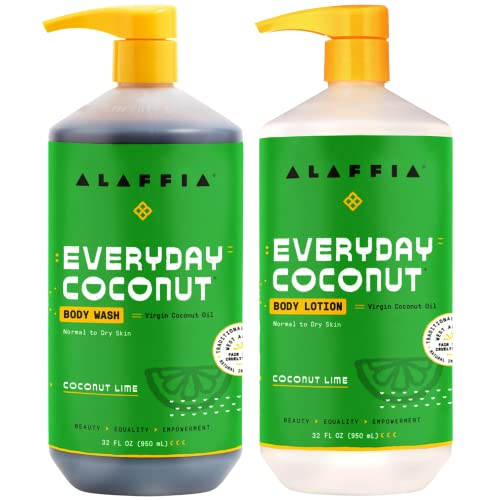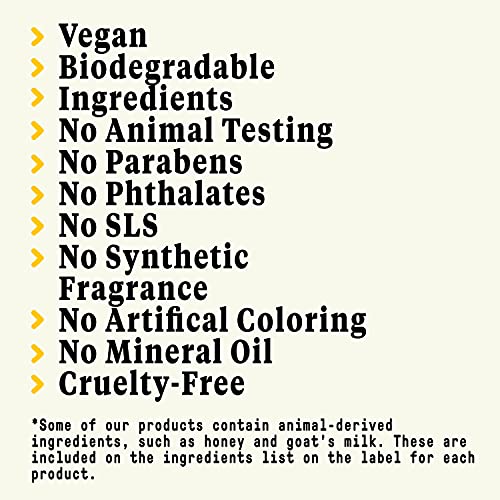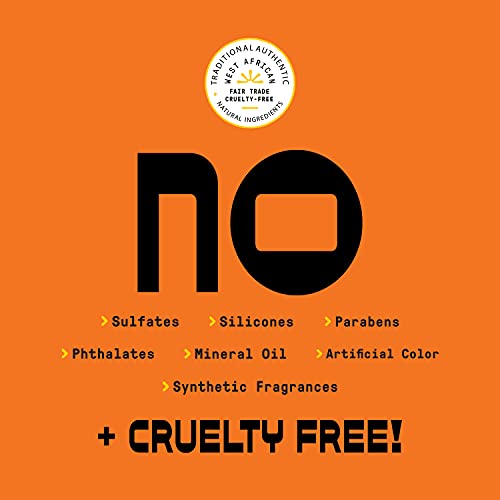




Alaffia Coconut Body Wash & Lotion - Hydrating, Fair Trade Ingredients, Coconut Lime - 32 Fl Oz Each


Cocamidopropyl Betaine
High RiskCocamidopropyl betaine is a synthetic surfactant derived from coconut oil, commonly used in personal care products for its mild cleansing and foaming properties. It functions as a surfactant, emulsifier, and thickening agent, contributing to the texture and performance of formulations.
Sustai Insights
Cocamidopropyl betaine offers functional benefits as a gentle surfactant, enhancing product foaming and texture. However, it may pose low to moderate allergenic risks and is subject to high use restrictions due to contamination concerns. Regulatory bodies have advised on its safe levels of usage, categorizing its risk level as high overall. Users should practice caution, particularly with sensitive populations, and consider alternatives like naturally derived surfactants for safer formulations.
Emulsifying Wax
Medium RiskEmulsifying wax is a mixture derived from plant and synthetic sources, primarily used to stabilize emulsions in cosmetic and personal care products. Its primary function is to blend oil and water-based ingredients, ensuring a uniform consistency and enhancing product texture.
Sustai Insights
Emulsifying wax offers functional benefits as an effective emulsifier, helping to create stable formulations in cosmetic products. It generally poses low health risks, with minimal concerns regarding carcinogenicity and allergenic potential. Environmental risks are also low, with no significant pollutant or bioaccumulation issues. However, use restrictions exist, and irritation potential is noted for sensitive skin. Regulatory assessments indicate it is safe for use within established concentration limits, leading to an overall moderate risk assessment. Alternatives like plant-based emulsifiers may offer sustainable options.
Phenoxyethanol
Medium RiskPhenoxyethanol is a preservative used in cosmetics and personal care products to prevent microbial growth and extend shelf life. It is commonly found in formulations such as lotions, creams, and serums.
Sustai Insights
Phenoxyethanol serves effectively as a preservative, ensuring product stability and safety by inhibiting microbial growth. It is considered to have low health risks regarding carcinogenicity, allergies, and reproductive toxicity. However, moderate use restrictions exist, and regulatory bodies have advised caution in specific applications. Environmental concerns include its potential as a pollutant, although it is not highly bioaccumulative. Overall, the ingredient presents a medium risk level, with safe usage practices recommended and alternative preservatives available for those seeking greener options.
Potassium Sorbate
Medium RiskPotassium sorbate is a potassium salt of sorbic acid, primarily used as a preservative in food and cosmetic products. It inhibits the growth of molds, yeast, and some bacteria, extending the shelf life of products. It is commonly found in various formulations due to its effectiveness and low toxicity.
Sustai Insights
Potassium sorbate serves as an effective preservative, preventing microbial growth in food and cosmetic products, which is vital for safety and longevity. Although it has a low risk of carcinogenicity and developmental toxicity, there is a moderate concern regarding allergies and immunotoxicity. Environmentally, it poses minimal risks as it is not significantly bioaccumulative. Regulatory agencies have verified its use, although some products may face restrictions. Overall, it is assessed as a medium risk ingredient, with safe usage practices recommended, and alternatives such as natural preservatives could be considered.
Caprylyl/ Capryl Glycoside
Low RiskCaprylyl/Capryl Glycoside is a surfactant derived from natural sources, primarily used in personal care and cosmetic products for its emulsifying properties. It helps to stabilize formulations and enhance cleaning efficacy while being gentle on the skin.
Sustai Insights
Caprylyl/Capryl Glycoside offers functional benefits as a mild surfactant and emulsifier, contributing to product stability without significant irritation. It is biodegradable and considered sustainably sourced. Health risks are low, with minimal concerns regarding carcinogenicity and developmental toxicity. Environmental impact is also low, as it does not accumulate in ecosystems. Regulatory assessments indicate no current restrictions. Overall, it presents a low risk profile, making it a suitable choice in formulations.
Citrus Aurantifolia (Lime) Fruit Extract
Low RiskCitrus aurantifolia (lime) fruit extract is derived from the fruit of the lime tree. It is commonly used in cosmetic formulations for its aromatic properties and potential skin benefits, often included for fragrance or as a natural preservative due to its antioxidant content.
Sustai Insights
Citrus aurantifolia (lime) fruit extract offers functional benefits, including antioxidant properties and a refreshing scent, contributing to product appeal. It has a low risk profile concerning health impacts, with minimal concerns for carcinogenicity, allergies, or reproductive toxicity. Environmental risks are also low, as it is not known to be a pollutant or bioaccumulative. Regulatory status indicates that it is allowed in cosmetics with no specific restrictions. Overall, safe usage practices should be followed, and while alternatives exist, they may not replicate all benefits. Thus, the overall risk assessment is low.
Cocos Nucifera (Coconut) Water
Low RiskCocos Nucifera (coconut) water is an aqueous extract derived from the fruit of the coconut palm. It is commonly used in cosmetic and personal care products for its hydrating and soothing properties. Coconut water is rich in electrolytes and nutrients, making it a popular ingredient in formulations aimed at hydration.
Sustai Insights
Coconut water provides effective hydration and possesses antioxidant properties, contributing to skin health. It is sustainably sourced and biodegradable, enhancing its environmental profile. Health risks are minimal, with low concerns for carcinogenicity, allergies, or reproductive toxicity. Regulatory bodies do not impose significant restrictions on its use, marking it as a low-risk ingredient. Safe usage practices recommend using it in formulations designed for topical application, with alternatives including aloe vera for similar hydration benefits.
Hydrogenated Coconut Oil
Low RiskHydrogenated coconut oil is an end product of the hydrogenation process, where coconut oil is chemically altered to enhance its stability and shelf-life. It serves primarily as an emollient and thickening agent in cosmetic formulations, providing a smooth texture and moisturizing properties.
Sustai Insights
Hydrogenated coconut oil offers functional benefits as a moisturizing agent and stabilizer in formulations. It is generally recognized as safe with low risks for cancer, allergies, and reproductive toxicity, according to the Cosmetic Ingredient Review (CIR). Environmental impacts are minimal, with no significant pollutant potential. Regulatory bodies have not issued advisories against its use. Overall, the ingredient presents a low risk profile, making it a suitable choice in cosmetic products. For those seeking alternatives, natural oils or non-hydrogenated variants may be considered.
Butyrospermum Parkii (Shea) Butter
Low RiskButyrospermum parkii (shea) butter is a vegetable fat derived from the nuts of the shea tree. It is commonly used in cosmetic formulations for its emollient properties, providing moisture and improving skin texture. Additionally, shea butter is known for its ability to enhance the stability of products and deliver a creamy texture.
Sustai Insights
Shea butter offers functional benefits as an effective moisturizer, enhancing skin barrier function and texture. It is sustainably sourced and biodegradable, contributing to eco-friendliness. Health-wise, it is associated with low risks for carcinogenicity, allergies, and reproductive toxicity. Environmental impacts are minimal, with no significant pollutant potential identified. Regulatory assessments indicate no current restrictions. Overall, the ingredient presents a low risk, making it a favorable choice in cosmetic formulations.
Stearic Acid
Low RiskStearic acid is a naturally occurring fatty acid commonly found in animal and vegetable fats. It functions primarily as an emulsifier, thickener, and stabilizer in cosmetic and personal care products, providing texture and consistency.
Sustai Insights
Stearic acid offers functional benefits such as effective emulsification and stabilization of formulations. It is derived from renewable sources and is biodegradable, contributing to its sustainability profile. Health risks are low, with minimal concerns regarding carcinogenicity, allergies, or reproductive toxicity. Environmental risks are also low, with no significant pollutants or bioaccumulation concerns noted. Regulatory bodies, including the FDA, do not impose restrictions on its use. Overall, stearic acid is assessed as low risk, and its safe usage practices are well-established, with no significant alternatives needed.
Sea Salt
Low RiskSea salt is a mixture of inorganic salts derived primarily from the evaporation of seawater. It consists mainly of sodium chloride, with minor amounts of other minerals. Sea salt is commonly used as a seasoning and preservative in food products and may also have applications in cosmetics and personal care items.
Sustai Insights
Sea salt serves as an effective flavor enhancer and preservative, contributing to the taste and shelf-life of food products. It is generally considered safe with low risk for health concerns such as cancer, allergies, and reproductive toxicity. Environmental impact is minimal, as it does not contribute significantly to pollution or bioaccumulation. Regulatory bodies, including the FDA, currently do not impose restrictions on its use. Overall, the risk level associated with sea salt is low, making it a widely accepted ingredient with no significant adverse effects reported.
Cocos Nucifera (Coconut) Oil
Low RiskCocos Nucifera (Coconut) Oil is derived from the kernels of the coconut palm. It is primarily used in cosmetic formulations for its emollient and moisturizing properties, making it suitable for skin and hair care products.
Sustai Insights
Coconut oil serves as an effective moisturizer and emollient, promoting skin hydration and softness. It is sustainably sourced and biodegradable. Health risks are minimal, with low concerns regarding carcinogenicity, allergens, and reproductive toxicity. Environmental impact is also low, as it does not contribute significantly to pollution or bioaccumulation. Regulatory bodies have not issued restrictions on its use. Overall, coconut oil presents a low risk for health and environmental concerns, making it a safe ingredient in cosmetic products.
Ascorbic Acid (Vitamin C)
Low RiskAscorbic acid (Vitamin C) is a naturally occurring antioxidant essential for various biological functions, including collagen synthesis and immune response. It is commonly used in cosmetic and food products for its preservative properties and ability to enhance skin brightness.
Sustai Insights
Ascorbic acid provides functional benefits as an effective antioxidant and preservative, contributing to skin health and product stability. It is generally recognized as safe with low health risks, including minimal concerns for carcinogenicity and allergies. Environmentally, it poses low risks, as it is biodegradable and does not bioaccumulate. Regulatory bodies like the FDA have not imposed significant restrictions on its use. Overall, the ingredient presents a low risk, with safe usage practices ensuring consumer safety, and alternatives such as natural extracts exist for those seeking different formulations.
Caprylyl/ Capryl Glycoside
Low RiskCaprylyl/Capryl Glycoside is a surfactant derived from natural sources, primarily used in personal care and cosmetic products for its emulsifying properties. It helps to stabilize formulations and enhance cleaning efficacy while being gentle on the skin.
Sustai Insights
Caprylyl/Capryl Glycoside offers functional benefits as a mild surfactant and emulsifier, contributing to product stability without significant irritation. It is biodegradable and considered sustainably sourced. Health risks are low, with minimal concerns regarding carcinogenicity and developmental toxicity. Environmental impact is also low, as it does not accumulate in ecosystems. Regulatory assessments indicate no current restrictions. Overall, it presents a low risk profile, making it a suitable choice in formulations.
Emulsifying Wax
Medium RiskEmulsifying wax is a mixture derived from plant and synthetic sources, primarily used to stabilize emulsions in cosmetic and personal care products. Its primary function is to blend oil and water-based ingredients, ensuring a uniform consistency and enhancing product texture.
Sustai Insights
Emulsifying wax offers functional benefits as an effective emulsifier, helping to create stable formulations in cosmetic products. It generally poses low health risks, with minimal concerns regarding carcinogenicity and allergenic potential. Environmental risks are also low, with no significant pollutant or bioaccumulation issues. However, use restrictions exist, and irritation potential is noted for sensitive skin. Regulatory assessments indicate it is safe for use within established concentration limits, leading to an overall moderate risk assessment. Alternatives like plant-based emulsifiers may offer sustainable options.
Phenoxyethanol
Medium RiskPhenoxyethanol is a preservative used in cosmetics and personal care products to prevent microbial growth and extend shelf life. It is commonly found in formulations such as lotions, creams, and serums.
Sustai Insights
Phenoxyethanol serves effectively as a preservative, ensuring product stability and safety by inhibiting microbial growth. It is considered to have low health risks regarding carcinogenicity, allergies, and reproductive toxicity. However, moderate use restrictions exist, and regulatory bodies have advised caution in specific applications. Environmental concerns include its potential as a pollutant, although it is not highly bioaccumulative. Overall, the ingredient presents a medium risk level, with safe usage practices recommended and alternative preservatives available for those seeking greener options.
Citrus Aurantifolia (Lime) Fruit Extract
Low RiskCitrus aurantifolia (lime) fruit extract is derived from the fruit of the lime tree. It is commonly used in cosmetic formulations for its aromatic properties and potential skin benefits, often included for fragrance or as a natural preservative due to its antioxidant content.
Sustai Insights
Citrus aurantifolia (lime) fruit extract offers functional benefits, including antioxidant properties and a refreshing scent, contributing to product appeal. It has a low risk profile concerning health impacts, with minimal concerns for carcinogenicity, allergies, or reproductive toxicity. Environmental risks are also low, as it is not known to be a pollutant or bioaccumulative. Regulatory status indicates that it is allowed in cosmetics with no specific restrictions. Overall, safe usage practices should be followed, and while alternatives exist, they may not replicate all benefits. Thus, the overall risk assessment is low.
Cocos Nucifera (Coconut) Water
Low RiskCocos Nucifera (coconut) water is an aqueous extract derived from the fruit of the coconut palm. It is commonly used in cosmetic and personal care products for its hydrating and soothing properties. Coconut water is rich in electrolytes and nutrients, making it a popular ingredient in formulations aimed at hydration.
Sustai Insights
Coconut water provides effective hydration and possesses antioxidant properties, contributing to skin health. It is sustainably sourced and biodegradable, enhancing its environmental profile. Health risks are minimal, with low concerns for carcinogenicity, allergies, or reproductive toxicity. Regulatory bodies do not impose significant restrictions on its use, marking it as a low-risk ingredient. Safe usage practices recommend using it in formulations designed for topical application, with alternatives including aloe vera for similar hydration benefits.
Hydrogenated Coconut Oil
Low RiskHydrogenated coconut oil is an end product of the hydrogenation process, where coconut oil is chemically altered to enhance its stability and shelf-life. It serves primarily as an emollient and thickening agent in cosmetic formulations, providing a smooth texture and moisturizing properties.
Sustai Insights
Hydrogenated coconut oil offers functional benefits as a moisturizing agent and stabilizer in formulations. It is generally recognized as safe with low risks for cancer, allergies, and reproductive toxicity, according to the Cosmetic Ingredient Review (CIR). Environmental impacts are minimal, with no significant pollutant potential. Regulatory bodies have not issued advisories against its use. Overall, the ingredient presents a low risk profile, making it a suitable choice in cosmetic products. For those seeking alternatives, natural oils or non-hydrogenated variants may be considered.
Cocamidopropyl Betaine
High RiskCocamidopropyl betaine is a synthetic surfactant derived from coconut oil, commonly used in personal care products for its mild cleansing and foaming properties. It functions as a surfactant, emulsifier, and thickening agent, contributing to the texture and performance of formulations.
Sustai Insights
Cocamidopropyl betaine offers functional benefits as a gentle surfactant, enhancing product foaming and texture. However, it may pose low to moderate allergenic risks and is subject to high use restrictions due to contamination concerns. Regulatory bodies have advised on its safe levels of usage, categorizing its risk level as high overall. Users should practice caution, particularly with sensitive populations, and consider alternatives like naturally derived surfactants for safer formulations.
Butyrospermum Parkii (Shea) Butter
Low RiskButyrospermum parkii (shea) butter is a vegetable fat derived from the nuts of the shea tree. It is commonly used in cosmetic formulations for its emollient properties, providing moisture and improving skin texture. Additionally, shea butter is known for its ability to enhance the stability of products and deliver a creamy texture.
Sustai Insights
Shea butter offers functional benefits as an effective moisturizer, enhancing skin barrier function and texture. It is sustainably sourced and biodegradable, contributing to eco-friendliness. Health-wise, it is associated with low risks for carcinogenicity, allergies, and reproductive toxicity. Environmental impacts are minimal, with no significant pollutant potential identified. Regulatory assessments indicate no current restrictions. Overall, the ingredient presents a low risk, making it a favorable choice in cosmetic formulations.
Stearic Acid
Low RiskStearic acid is a naturally occurring fatty acid commonly found in animal and vegetable fats. It functions primarily as an emulsifier, thickener, and stabilizer in cosmetic and personal care products, providing texture and consistency.
Sustai Insights
Stearic acid offers functional benefits such as effective emulsification and stabilization of formulations. It is derived from renewable sources and is biodegradable, contributing to its sustainability profile. Health risks are low, with minimal concerns regarding carcinogenicity, allergies, or reproductive toxicity. Environmental risks are also low, with no significant pollutants or bioaccumulation concerns noted. Regulatory bodies, including the FDA, do not impose restrictions on its use. Overall, stearic acid is assessed as low risk, and its safe usage practices are well-established, with no significant alternatives needed.
Sea Salt
Low RiskSea salt is a mixture of inorganic salts derived primarily from the evaporation of seawater. It consists mainly of sodium chloride, with minor amounts of other minerals. Sea salt is commonly used as a seasoning and preservative in food products and may also have applications in cosmetics and personal care items.
Sustai Insights
Sea salt serves as an effective flavor enhancer and preservative, contributing to the taste and shelf-life of food products. It is generally considered safe with low risk for health concerns such as cancer, allergies, and reproductive toxicity. Environmental impact is minimal, as it does not contribute significantly to pollution or bioaccumulation. Regulatory bodies, including the FDA, currently do not impose restrictions on its use. Overall, the risk level associated with sea salt is low, making it a widely accepted ingredient with no significant adverse effects reported.
Cocos Nucifera (Coconut) Oil
Low RiskCocos Nucifera (Coconut) Oil is derived from the kernels of the coconut palm. It is primarily used in cosmetic formulations for its emollient and moisturizing properties, making it suitable for skin and hair care products.
Sustai Insights
Coconut oil serves as an effective moisturizer and emollient, promoting skin hydration and softness. It is sustainably sourced and biodegradable. Health risks are minimal, with low concerns regarding carcinogenicity, allergens, and reproductive toxicity. Environmental impact is also low, as it does not contribute significantly to pollution or bioaccumulation. Regulatory bodies have not issued restrictions on its use. Overall, coconut oil presents a low risk for health and environmental concerns, making it a safe ingredient in cosmetic products.
Ascorbic Acid (Vitamin C)
Low RiskAscorbic acid (Vitamin C) is a naturally occurring antioxidant essential for various biological functions, including collagen synthesis and immune response. It is commonly used in cosmetic and food products for its preservative properties and ability to enhance skin brightness.
Sustai Insights
Ascorbic acid provides functional benefits as an effective antioxidant and preservative, contributing to skin health and product stability. It is generally recognized as safe with low health risks, including minimal concerns for carcinogenicity and allergies. Environmentally, it poses low risks, as it is biodegradable and does not bioaccumulate. Regulatory bodies like the FDA have not imposed significant restrictions on its use. Overall, the ingredient presents a low risk, with safe usage practices ensuring consumer safety, and alternatives such as natural extracts exist for those seeking different formulations.
Potassium Sorbate
Medium RiskPotassium sorbate is a potassium salt of sorbic acid, primarily used as a preservative in food and cosmetic products. It inhibits the growth of molds, yeast, and some bacteria, extending the shelf life of products. It is commonly found in various formulations due to its effectiveness and low toxicity.
Sustai Insights
Potassium sorbate serves as an effective preservative, preventing microbial growth in food and cosmetic products, which is vital for safety and longevity. Although it has a low risk of carcinogenicity and developmental toxicity, there is a moderate concern regarding allergies and immunotoxicity. Environmentally, it poses minimal risks as it is not significantly bioaccumulative. Regulatory agencies have verified its use, although some products may face restrictions. Overall, it is assessed as a medium risk ingredient, with safe usage practices recommended, and alternatives such as natural preservatives could be considered.
Discover the rejuvenating power of Alaffia EveryDay Coconut Hydrating Body Lotion and Body Wash, expertly crafted for normal to dry skin. Infused with fair-trade virgin coconut oil and coffee berry extract, this duo cleanses and hydrates while promoting sustainable practices.
- Hydration & Cleansing: Gently cleanses and deeply moisturizes skin, leaving it soft and supple without harsh chemicals.
- Sulfate-Free Formula: Designed for sensitive skin, free from sulfates, parabens, and synthetic fragrances to ensure a gentle touch.
- Rich in Antioxidants: Packed with vitamin E and antioxidants from coffee berry, protecting skin from environmental stressors.
- Ethically Sourced Ingredients: Supports women-led cooperatives in West Africa, promoting education and community welfare through fair trade.
- Daily Use Convenience: Perfect for everyday use; simply lather, rinse, and follow with the lotion for optimal hydration.
Join Alaffia in their mission for a sustainable future while pampering your skin with nourishing, handcrafted care.
Subscribe & Save with Sustai
- Best Price Guarantee: Always enjoy the lowest prices on sustainable home essentials.
- No Surprises: We’ll notify you before shipping. No hidden fees, ever.
- You’re in Charge: Change, pause, or cancel your subscription anytime with ease.
- Eco-Friendly Deliveries: Our grouped shipments mean less packaging and lower emissions.
Join us on a sustainable journey. Special offers for a limited time! Prices and promotions may change.
Recommended Products
Discover the rejuvenating power of Alaffia EveryDay Coconut Hydrating Body Lotion and Body Wash, expertly crafted for normal to dry skin. Infused with fair-trade virgin coconut oil and coffee berry extract, this duo cleanses and hydrates while promoting sustainable practices.
- Hydration & Cleansing: Gently cleanses and deeply moisturizes skin, leaving it soft and supple without harsh chemicals.
- Sulfate-Free Formula: Designed for sensitive skin, free from sulfates, parabens, and synthetic fragrances to ensure a gentle touch.
- Rich in Antioxidants: Packed with vitamin E and antioxidants from coffee berry, protecting skin from environmental stressors.
- Ethically Sourced Ingredients: Supports women-led cooperatives in West Africa, promoting education and community welfare through fair trade.
- Daily Use Convenience: Perfect for everyday use; simply lather, rinse, and follow with the lotion for optimal hydration.
Join Alaffia in their mission for a sustainable future while pampering your skin with nourishing, handcrafted care.

You can have at most 2 Sustainable Steals products in your cart
Customer Reviews
Customers’ View
Customers appreciate the nourishing qualities of the Coconut Lime Body Wash and Lotion set, highlighting its effectiveness for normal to dry skin. Many users note the moisturizing benefits, with one customer stating that the lotion is 'moisturizing with healthy ingredients for the skin.' The gentle, sulfate-free body wash has been well-received for its ability to cleanse without stripping moisture, making it suitable for daily use. Additionally, the pleasant coconut lime scent is often mentioned as refreshing and not overpowering. Environmentally conscious consumers value the product's ethical sourcing and clean ingredients, aligning with their health-focused lifestyles. Overall, this body wash and lotion set is recognized for its hydrating properties and commitment to sustainability.
AI-generated from the text of customer reviewsThis product has no reviews yet.




